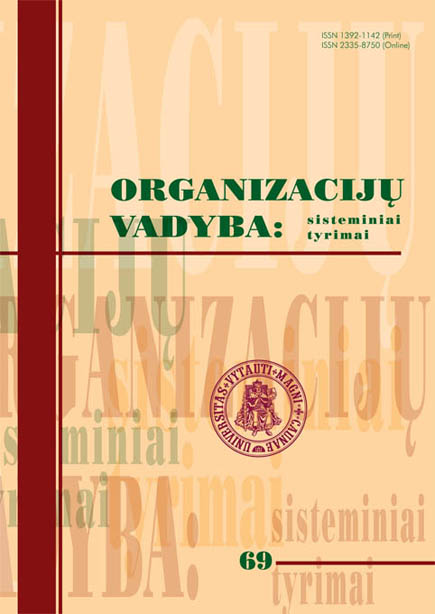Nepotizmo prevencija Lietuvos privataus sektoriaus organizacijose: teorinės gairės
Prevention of nepotism in Lithuanian private sector organizations: theoretical guidelines
Author(s): Loreta Petrauskaitė, Jolita VveinhardtSubject(s): Economy
Published by: Vytauto Didžiojo Universitetas
Keywords: Nepotizmas; Viešasis sektorius; Privatus sektorius; Prevencija; Nepotism; public sector; Private sector; Prevention
Summary/Abstract: Straipsnyje siekiama suformuluoti teorines nepotizmo gaires Lietuvos privataus sektoriaus organizacijose, pabrėžiant aktualią problemą, kad nepotizmas privačiame sektoriuje nereglamentuojamas teisiniais aktais. Nepotizmas aptariamas kaip daugiaaspektis socialinių tinklų, kuriuos sudėtinga identifikuoti remiantis vien tik giminystės ryšiais, formavimasis. Atkreipiamas dėmesys į susijusius mokslinius požiūrius, kurių įvertinimas gali būti reikšmingas nustatant problemos sprendimo gaires. Aptariami nepotizmo prevencijos viešajame ir privačiame sektoriuje aspektai, kuriuos įvertinus, organizacijų vadovams siūlomi įgyvendinti prevenciniai sprendimai, padėsiantys sumažinti reiškinio daromą žalą. In this article the attention is focused on the problem areas of nepotism research, with emphasis on the private sector, aiming to encourage scientific discussion that would draw the guidelines for further studies. Nepotism in both the private and the public sector is identified as a social network or networks, where private interests arise in relations with other concerned members and it conflicts with the organization/public interests. The formation of such networks threatens by the fact that both social and material capital may be created while some groups are discriminated by other groups. While a normative problem of a social network and a conflict of interest arising in it is highlighted as more relevant to the private sector, the issues of ethical evaluation are particularly relevant to both the private and the public sector. Prevention of nepotism in the business sector is treated as avoidance of the conflict between individual and organizational interests and creating barriers for their occurrence at the individual and organizational levels. However, inconsistency of nepotism discourse in the private sector makes the development of effective prevention measures difficult in practice, therefore, purification of evaluations of the phenomenon, the development of national business ethics and creation of the regulatory framework, providing more tools to managers of business organizations should become the main guidelines for the research. In this case, the experience of the valuable, identifying the contents of the conflict of interest and resolution measures, despite the possible objections of liberal policy supporters on vertical initiatives of the state. In addition, such initiatives should foster the debate between management professionals in the private sector, where the prevailing culture has an impact on the relationship between the private and the public sectors, and would create the threats of interest conflicts in the heart of the public sector. In this case, nepotism should be seen not as a problem of individual sectors, which should not be solved in isolation, but rather systematically, based on the approach of social ecology.
Journal: Organizacijų vadyba: sisteminiai tyrimai
- Issue Year: 2014
- Issue No: 69
- Page Range: 137-149
- Page Count: 13
- Language: Lithuanian

